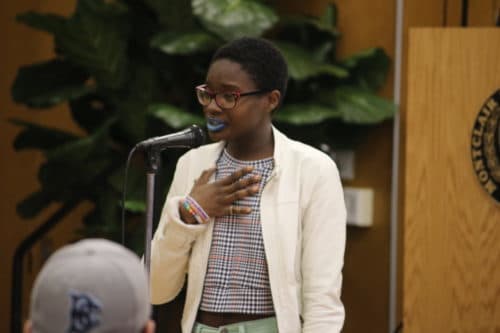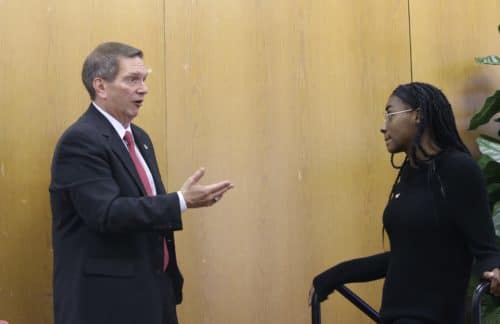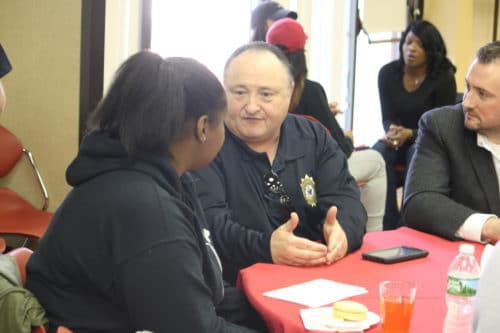
Dania Felix (pictured) and other students questioned University Police Chief Paul Cell, who said “everyone needs to accept all lives matter” earlier in the discussion.
Photo by Therese Sheridan
Over 200 faculty, students and administrators filled the Montclair State Student Center Ballrooms – some lining up around the back walls – on Wednesday to be part of an emotional discussion about Black Lives Matter.
The conversation ranged from the historical treatment of African Americans to students’ firsthand, painful experiences – and then Montclair State University Police Chief Paul Cell took the stage.
“There is no question that black lives matter,” Cell said. “There is no question that all lives matter.”
The back of the room collectively groaned at the utterance of “all lives matter.”
“I missed the joke. I’m sorry,” Cell said.
Later, Cell said everyone “needs to accept that all lives matter” and again the room groaned. Cell retorted, “Can’t hear?”

Cell (left) talked to student panelist Joniesha Hickson (right) after the first part of the event ended.
Photo by Therese Sheridan
Cell’s message focused on society’s need to not dwell on the past in order to move forward. Cell pledged his support for Black Lives Matter multiple times, but students and faculty said the point held less weight when he said “all lives matter.”
“Students were thinking, ‘Ugh, they don’t get it’ when they are hearing “all lives matter,” particularly in a forum about Black Lives Matter,” Reggie Walker, educational opportunity fund counselor and adjunct professor, said after the panel ended. “Students were not being disrespectful.”
After the panel discussion ended, students conversed at their tables about what they heard before the event went into its question and answer portion. Junior physical education major Dominic Bowman talked about Cell’s comments.
“It’s more obvious that black lives need to matter,” Bowman said. “It’s a badge issue, not a black versus white thing.”
“Black Lives Matter, Beyond the Hashtag” was a panel discussion hosted by Montclair State’s Office Equity & Diversity during the school’s 12th annual Diversity Week. The event included speeches by professors Dr. Jason Williams and Sandra Lewis, students Joniesha Hickson and Brandon Edwards, and Cell.
Beyond Cell’s remarks, students also discussed the best way to move forward after the event ended.
“The solution is having more conversations like this,” said freshman undeclared major Abigail Ricks. Ricks said she sat down with three other white girls in her dorm and had a “dope” conversation for two hours where they talked about all of the issue the African American community faced.

Some students had the opportunity to share their concerns with university police officers at their table after the panel discussion ended.
Photo by Therese Sheridan
After Williams gave a presentation on the historical context behind the treatment of African Americans, Edwards jumped into a personal story about his encounter with police.
“When I was 17, there was a domestic issue in my house and it was the first time I ever had to call the police,” Edwards said. “I called the police, and when they got there, they thought I was the issue, despite me being the caller. The officer told me, ‘If I get a call about you again, I’m going to hurt you’.”
Edwards noted the officer who told him that was African American.
“If I’m in danger, and I’m supposed to call the police, and the police might potentially put me in my danger, who then am I going to call?” Edwards said. “I was sitting on my bedroom floor feeling helpless and thinking, who do I call?”
Students and faculty also shared their reactions to the killings of Alton Sterling and Philando Castile – two African American men who were killed by police in July – and mainly expressed a feeling of hopelessness. At the end of the question and answer session, one student teared up as he talked about how his aunt was killed in the Charleston shooting, a mass shooting in July 2015 where nine people were killed a church by Dylann Roof.
Faculty and, notably, Cell gathered around him to comfort him. They were all treated to raucous applause.


